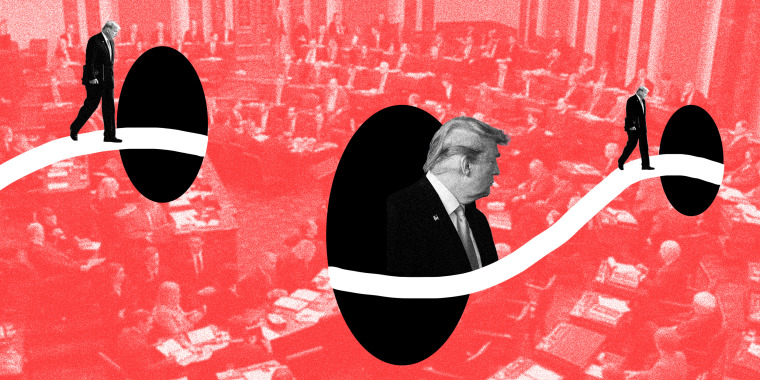Stop me if this sounds familiar: President Donald Trump has done or said a thing that has set Twitter ablaze. You send a link to your group chat. Someone responds, "How is that legal?"
Maybe it shouldn't be. Maybe it isn't. Either way, it's a question Congress must answer in its next session.
Trump spent four years riding roughshod over norms and standards that have been in place for decades. It turns out that just kind of hoping the country's chief executive follows the laws and is cowed by the threat of impeachment doesn't cut it in the face of concerted malice. And to make sure it doesn't happen with future presidents, Congress needs to undertake the kind of government overhaul not seen since Watergate.
After President Richard Nixon resigned rather than face impeachment and removal, Congress took it upon itself to enact changes that could prevent similar abuses. They included the establishment of the Federal Election Commission, the passage of the Privacy Act of 1974 and the creation of the federal inspectors general system. But in the decades since then, many of these attempts to wrest power back from the executive branch have slowly retracted.
Congressional authority over spending, declaring war and acting as a guardrail on the presidency were all eroding before Trump was inaugurated. Once in office, Trump did what he's done for years as a businessman — skillfully exploit every loophole available to him while blowing holes in other protections to create new loopholes. That's taken the form of tweeting demands for investigations of his political opponents, finding ways to keep generating profit from his businesses while in office and refusing to hand over documents to Congress that could show wrongdoing on his part.
Congress needs to undertake the kind of government overhaul not seen since Watergate.
Not all of the norms he's violated can be upheld via legislation — and not all of them should be, lest they overcompensate and erase the divisions of power Congress is now trying to reinforce. But that still leaves plenty to tackle in 2021.
Some of the bigger changes have already made their way into draft legislation. House Democratic leadership introduced the Protecting Our Democracy Act on Sept. 23, almost a year to the day after the House announced its formal impeachment inquiry into Trump. Among the 12 sections in the bill are provisions to: add new layers of accountability for acting officials, Trump's preference over Senate-confirmed appointees; add time limits on emergency declarations by the president, like the one Trump declared on the southern U.S. border; and limit presidential interference in Justice Department investigations.
The bill, if passed and signed into law, would also strengthen the independence of inspectors general, who have been a target of Trump's ire in the aftermath of the impeachment saga. Political appointees who violate the Hatch Act's bans on partisan campaign activities — as Trump's appointees have been very willing to do — would face consequences, too. The bill would give the Office of Special Counsel the authority to levy "an administrative fine of up to $50,000" against employees who aren't disciplined by the president for their violations.
Even that comprehensive legislation would still leave a bunch of the loopholes that Trump has taken advantage of, though, including those involving presidential taxes. Nixon set the standard for releasing tax returns in 1974, trying to prove his claim that "I'm not a crook." Last year, California's Supreme Court struck down a state law that would have forced candidates to disclose their tax returns in order to appear on the ballot. But Congress can still mandate that presidential campaigns turn over candidates' taxes to the FEC when filing their candidacies.
That change and others will work best if Congress acts against its own selfish interests and does something many politicians on both sides are loath to do: give the FEC some teeth. The commission has been a punchline in Washington since I was a kid. Its long-standing practice of appointing three Democrats and three Republicans means paralyzing deadlock is common. It also spent most of the 2020 election cycle without the minimum members needed for a quorum, emphasizing its uselessness. And it's not clear when the two belated nominees — who would still leave the FEC one commissioner short — will get a vote.
Given the lessons learned from Trump's impeachment and subsequent Senate acquittal, Congress needs to ensure that the partisan nature of the process doesn't allow presidential abuses to continue. That could include a number of options, from setting clearer standards for the Justice Department to investigate sitting presidents into law to reviving the defunct independent counsel role.
But much of this agenda hinges on two factors, unfortunately. First, these bills have to pass through both the House and the Senate, the latter of which may still be controlled by Republicans come January. If Sen. Mitch McConnell is still majority leader, the odds that the Protecting Our Democracy Act would reach President Joe Biden's desk quickly approach zero. Second, real reform would require members of both parties to accept that these rules need to apply equally to their own candidates, as well as their opponents.
For the good of the country, though, we have to fix these deficiencies before we encounter a nightmare scenario: someone as confident at bending the rules as Trump, but with the focus and determination to follow through. The time to safeguard against this future candidate is now, not later, when we would lament what we might have deterred.

